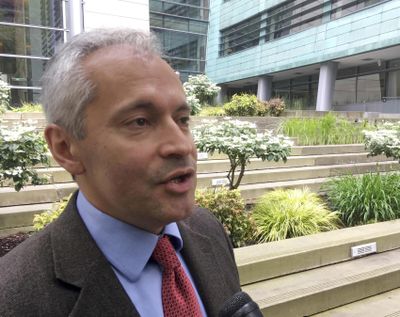US judge blocks restriction on immigrant legal help

SEATTLE – A federal judge temporarily blocked a Justice Department decision that immigrant legal rights organizations around the country said would curtail much of the work they do help those facing deportation.
U.S. District Judge Richard Jones issued his ruling Wednesday immediately following oral arguments in a lawsuit brought by the nonprofit Northwest Immigrant Rights Project.
The Justice Department last month sent the group a cease-and-desist letter saying it cannot provide certain legal assistance to immigrants unless it undertakes formal representation of them in court. The nonprofit says it doesn’t have the resources to do that, as formal representation can require intensive investigation of a client’s case and remaining involved until its resolution.
The order would force it and similar groups around the country to stop preparing motions and other documents on behalf of immigrants who represent themselves, the organization said.
The judge agreed that the Justice Department’s action would violate the Northwest Immigrant Rights Project’s constitutional rights to freedom of speech, association and to petition the government, and that the cease-and-desist letter would limit its work – forcing many immigrants to go without legal help, since people facing deportation are not entitled to an attorney the way criminal defendants are. He barred the Justice Department from sending such letters to any other nonprofit organizations doing similar work around the nation.
Jorge Baron, executive director of the Seattle-based nonprofit, said his attorneys had been turning away assistance requests from three to four dozen immigrants a week since receiving the letter, many of whom are in detention.
“We’re excited to be able to get back to work,” Baron said afterward.
The Justice Department’s Executive Office of Immigration Review cited a rule adopted in 2008 and designed to help stamp out attorney misconduct and so-called “notario” fraud, in which people unauthorized to practice law advertised themselves as able to help immigrants obtain lawful status. DOJ attorney Victor Mercado-Santana told Jones that the rule was a legitimate exercise of the government’s authority to regulate the lawyers who appear in immigration court for purposes of sanctioning them for any misconduct.
Since the rule took effect, the Northwest Immigrant Rights Project has noted its involvement on any motions it filed on behalf of otherwise unrepresented immigrants, the judge said, so it wouldn’t be difficult for immigration courts to trace any ethically questionable motions to the attorneys who filed them. In fact, Jones said, it was only because the group included those notes that the Justice Department even knew to send it the letter.
“Is that the effect? They’re being punished for being honest?” he grilled the government attorney.
He repeatedly questioned the point of applying the rule to a well-regarded, nonprofit organization which, as Mercado-Santana conceded, is doing important work in the face of a massive backlog of immigration cases. And he questioned the timing of the cease-and-desist letter: After following the same practice for more than eight years without challenge, Northwest Immigrant Rights Project received the cease-and-desist letter in April, just after it sued to block President Donald Trump’s travel ban. The judge didn’t reference that lawsuit directly, but noted that among the numerous organizations doing free immigration legal work, the letter had been sent “just this time – to just this agency.”
“The regulation’s been sitting around for a number of years,” he said. “What’s the urgency?”
Mercado-Santana reiterated the government’s desire to regulate attorneys in immigration court.
Arguing for Northwest Immigrant Rights Project, lawyers James Harlan Corning and Jaime Drozd Allen insisted that the government’s purported effort to ensure people receive ethical counsel in immigration court would actually drive more of them to “notarios.”
“Immigrants will be deprived of legal services and they will have no place else to turn,” Corning said. “Of course the ideal would be to provide full representation to every immigrant in every setting. … We don’t live in that world.”
The government’s position would force people into attorney-client relationships they might not otherwise want, in violation of the Constitution, and would usurp from the state the power of regulating the relationship between the attorney and potential client, Corning and Drozd said.
The state Attorney General’s Office and the American Civil Liberties Union of Washington filed briefs supporting the organization.